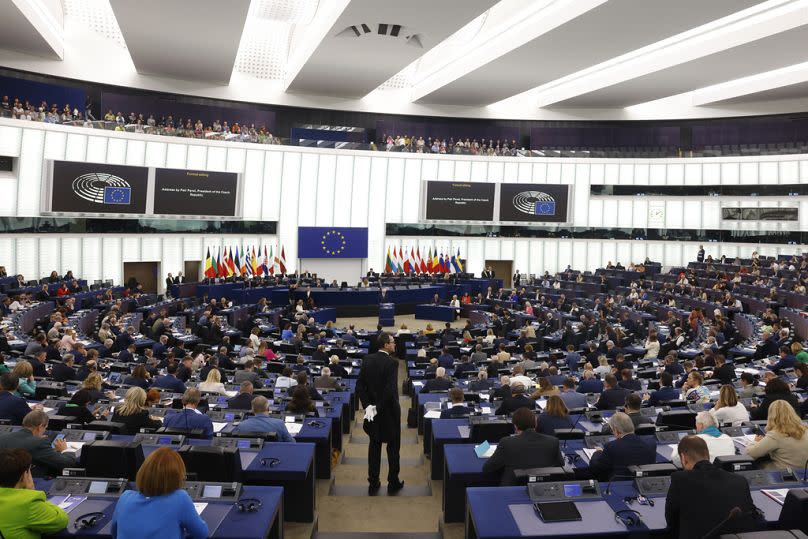The rise of artificial intelligence and its increasing presence in our daily lives has sparked a plethora of debates.
Among them, the issue of its governance has emerged as one of the most pressing issues of our time, with Brussels leading the race to regulate AI with its flagship AI law.
However, regulation does not come without hurdles, and solutions will undoubtedly shape the future of technology and European citizens.
At this year’s International Artificial Intelligence Summit, organized by Euronews in Brussels on November 8, Euroviews spoke to Jeremy Rollisonhead of EU policy and European government affairs at Microsoft Europe, on many of the questions surrounding European and global regulatory cooperation, and what this will mean in practice.
Euroviews: At the Brussels Tech Forum in 2018, you mentioned AI as one of the two emerging technologies that will have the biggest impact on people and their relationship with technology. How much more is yet to come?
Jeremy Rollison: At Microsoft we have been working on AI for decades. It’s already built into many of our products and our customers use it every day.
But this year we saw AI accelerate more than ever and become mainstream with the advent of large language models and generative AI. Technology is expanding human capabilities and changing everything about the way we live, work and learn.
We see AI supporting research into new medicines, finding solutions to accelerate the decarbonization of power grids, and improving cybersecurity.
We also see technology driving economic growth by supporting the development of new products and services.
So we really see AI playing a key role in helping to address some of society’s most pressing challenges.
Euroviews: You often have the opportunity to talk to decision makers about the different challenges they face in regulating AI. Can you share with us some of the key insights into what can be done and what needs to be done to ensure future-proof regulation, especially in the EU?
Jeremy Rollison: A balance must be struck between supporting Europe’s innovation capacity and ensuring the protection of Europeans’ rights and values.
Legislation is needed to achieve the right balance. As AI technology continues to develop at a rapid pace, an ongoing dialogue between businesses, governments, corporations, civil society and academia is important.

AI governance frameworks must keep pace with technological innovation and we need diverse voices around the table to make this happen.
In this way we minimize risks and maximize opportunities, allowing people to use the technology safely and unlocking benefits for society as a whole.
Ultimately, it is about promoting responsible innovation of a technology that we believe will lead to enormous economic growth in Europe and beyond.
Euroviews: There has been a lot of talk about future-proofing. Can we really see that far ahead?
Jeremy Rollison: We certainly have to look ahead. The EU has ambitious plans – take, for example, the goals of the Digital Decade and the European Green Deal.
AI will play a key role in achieving this transformation, including accelerating the deployment of sustainability solutions and the development of new ones – faster, cheaper and better.
A good example is the Belgian startup BeeOdiversity, which has developed an AI-based system used by farmers to measure environmental impact and better protect biodiversity.
What is important is to ensure that frameworks are in place to address potential emerging risks. The pace of innovation is so fast and we need safety breaks built into AI systems by design.
We also need frameworks that allow us to respond quickly to new challenges, while ensuring the AI ecosystem can thrive and companies in Europe can adopt the technology at scale.
Euroviews: In the past you have advocated for Data for All, making data available to everyone and not just a few people, be they governments or companies, especially in the context of AI development. How important is this access to data for AI and why?
Jeremy Rollison: Data plays a key role in responsibly advancing AI technology.
The value an organization gets from AI is largely determined by the quality of their data and how well their data is managed. Data powers algorithms and allows them to learn and make predictions.
Responsible data policies and practices for both input and output of AI models and applications make it possible to leverage AI while protecting user privacy, safety and security.


The growth of AI makes access to data and large language models more important than ever. AI models can perform a wide range of tasks using natural language – from drafting the first draft of a presentation to writing computer code.
Furthermore, AI’s ability to process large data sets and provide insights could be crucial in advancing key societal challenges, for example accelerating progress on climate action.
AI technologies can be used to analyze energy consumption patterns and optimize the use of renewable energy sources or to assist in the efficient management of natural resources and propose conservation strategies.
Euroviews: What would be the ways to address the concerns of legislators but also of citizens when they hear the words ‘free access to data’? What can be done to assure them that their personal information is safe and private?
Jeremy Rollison: People will only use technology they trust. We believe that customers’ data belongs to them and them alone.
Data processed by AI products is also subject to the GDPR and our customer obligations for data privacy and security, which often go beyond the strict data privacy laws in the EU.
Organizations large and small are deploying AI solutions because they can achieve more at scale and more easily with the right and responsible AI protection at the enterprise level.
Customers can trust that the AI applications they deploy on our platforms meet legal and regulatory requirements for responsible AI and that we keep their data safe.
Our mission is to empower customers to achieve more and empower them to drive their own innovation. Their success is our success.